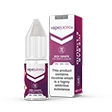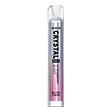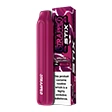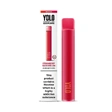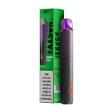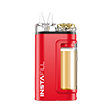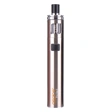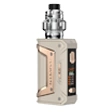
With their delicious flavours and accessible design, it’s easy to see why disposable vapes are a top choice for many vapers. However, despite their many benefits, they do pose some environmental issues.
For starters, most disposable vapes typically have a hard plastic exterior, contain electronics and a lithium ion battery. None of which you can put in your household recycling, and certainly not in your household waste bin either.
So what should you do with a disposable vape when you’re finished with it? In this guide, we’ll explain how to dispose of your vapes responsibly, so you can enjoy a guilt-free vaping experience.
How to Dispose Of Vapes In The UK
Disposing of vapes in the UK is relatively simple despite many people not recycling them. The easy way to dispose of disposable vape is to give them to your local recycling centre.
Use the WEEE bins at your local recycling centre
Head to your local council website and learn about their WEEE initiative. The council encourages people to use Waste Electric and Electronic Equipment recycling bins to promote sustainability. You can collect your used disposables and then hand them in, making it easier to protect the environment and enjoy the convenience disposable vapes offer.
How to properly dispose of single-use vapes in the UK?
According to research from Material Focus, just 17% of people recycle their vapes correctly, leading many to worry that disposables are causing environmental issues. Further to this, Zurich reported that three single use vapes per second are discarded of incorrectly.
However, proper disposal practices can rectify the negative perceptions of disposables. Vapes are easy to use, and once you understand the different components, it’s easier to use them responsibly.
To break it down (pun intended) disposables contain a lithium battery, wicks, steel, and copper wires – with some elements being recyclable.
Batteries
Lithium is one of the world’s most valuable materials and needs to be recycled properly. Disposable vapes use lithium batteries, and failing to recycle them properly can lead to wastage.
According to research by The Bureau Investigates, around 10 tons of lithium from single-use vapes is wasted yearly in landfills. However, if people recycle disposable vapes, we’ll have enough lithium to ensure its continued usage.
All you need to do is take the battery to your local authority’s waste centre and dispose of it at the battery recycling point. If you’re unsure where to go, Recycle Your Electricals allows you to type in a postcode and shows you the nearest battery recycling point.
Wicks & coils
The cotton wick is an integral component of disposable vapes, but these materials often aren’t recyclable. If your vape device has rubber stoppers, you’ll also need to dispose of these in your regular bin.
Coils separated from wicks can be recycled, and copper is a valuable material, so it’s always a good idea to collect them and give them to your local recycling centre.
Why you shouldn’t just throw a disposable vape away
Proper vape disposal might seem like an unnecessary headache, but disposable vapes contain materials and components that can cause harm to the environment. Just throwing them in the bin can cause numerous issues, but proper recycling ensures disposables have minimal environmental impact.
Here’s why you should never throw your disposables in the bin.
Negative environmental impact
Disposable vapes are designed to be lightweight and compact, and manufacturers often use plastic and metal for their outer casing. According to research from IBC, certain plastics can take over 1000 years to degrade, while batteries usually take 100 years.
When you throw these materials away, they can spend years in landfills and impact the environment negatively.
Hazardous waste
Most disposables have built-in batteries that are usually lithium-ion. While these batteries offer more longevity, they can also cause environmental issues through corrosion or leaks.
In some cases, failing to dispose of the vape properly can cause the built-in battery to catch fire and explode.
Accumulation of waste
Local authorities collected 23,661 tons of household waste in 2022, putting landfills under a lot of pressure (Statista). The improper disposal of old vapes can add to the volume of waste, creating major problems for local authorities.
As plastic and batteries take longer to degrade, leaving them in landfills only contributes to the ongoing battle to save our planet.
It’s irresponsible
If every person contributes positively to the environment, it might be possible to reverse the damage we cause as a society. Ensuring you recycle e-cigarettes correctly means taking responsibility for your actions and lowering your carbon footprint.
You can enjoy disposable vapes guilt-free
Now you know how to recycle vapes safely, you can enjoy sampling various flavours without dealing with ethical problems. As one of the UK’s most reputable vape shops, we stock a variety of delicious disposables from Elf, Crystal, Gold Bar, Lost Mary and many more.
With fantastic savings and epic bulk buys, we make stocking up on your favourite flavours easier. Buy ten disposable vapes for just £33.95 and enjoy speedy UK delivery. Vaping with us gives you the perfect combination of quality and value for money.
FAQs
Are there alternatives to disposable vapes?
Yes, you can buy refillable vape kits, which are less convenient than disposables. However, some people prefer them as they can be more cost-effective. Beginners should opt for starter kits, which require minimal customisation, but there are also Sub Ohm kits for DTL vapers and mods.
Can I salvage a dead disposable?
As disposables run off batteries, which usually last for around 500 to 600 puffs, many people think they’re dead once the battery flashes. However, it is sometimes possible to get some extra life out of your disposable – as long as it has a USB port.
Should I put vape components in my household recycling bin?
Some people think they can put their e-cigarettes in a general household waste bin, but this often means the battery doesn’t go to the right place. Putting electrical components in a battery recycling bin ensures that lithium doesn’t go to waste.






